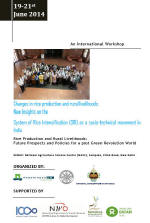|
The workshop addresses
current challenges for food security and livelihoods in India by
looking at the production of food crops by farmers in interaction with
the agricultural innovation system. A key focus is on a specific
alternative to agricultural intensification presented in recent years:
the System of Rice Intensification (SRI). SRI comprises a set of
agronomic principles for rice cultivation, targeted at productivity
increase with low use of external inputs and sustainable use of water
and nutrients. Significant saving in crucial inputs; seed, water and
agro-chemical along with climate resilience capability of the
innovation have attracted all attention.
The aim of the workshop is
to bring together results from several projects and programmes and its
implications for the policy agendas regarding agricultural research,
food security and rural development. Over the past four years a major
research programme from Indian partners together with Wageningen
University, the Netherlands, investigated SRI in India. This will be
supplemented with number of Indian studies in recent years.
The studies presented in
this workshop address the social and technical changes in cultivation
practices as well as the wider institutional dynamics set in motion
with the introduction of SRI in India as well as internationally. The
prime movers behind the elaboration and spread of SRI methods have
been farmers, field-level agronomists and extensionists and CSOs
rather than the formal institutions of rice science. The overall
question is how to understand and explain the spread of SRI as a
socio-technical phenomenon and driver of agrarian change?
The research findings are
expected to be of direct relevance for policy. The workshop thus also
addresses what policy makers and agricultural research institutes can
learn from SRI about the dissemination of novel scientific knowledge
and agricultural practice. The findings of few premium studies on
scientific validation of the principles and processes of system of
crop intensification including SRI, will add more confidence to
variety of stakeholders.
Beyond the mere increase
of production and productivity, food security includes issues as
diverse as poverty reduction, sustainable use of resources like land
and water, the role of science as well as changes in labour, cropping
patterns and markets. This variety of mutually interacting factors
requires an integrated approach. By making no prior assumptions about
the defining technical or social characteristics of SRI in India, the
studies have identified with greater precision what SRI in India
actually is and how it works. The combination of qualitative and
quantitative data, examined from a variety of disciplinary and
conceptual perspectives, made it possible to systematically analyse
the key drivers and mechanisms behind the success of SRI in India.
By linking a diverse set
of studies and perspectives, the workshop aims to create a wider
understanding of food production and rural livelihoods in India,
creating new opportunities for science as well as policy paradigm.
|
An
International Workshop
Changes in Rice Production and Rural Livelihoods - New Insights on
the System of Rice Intensification (SRI) as a socio-technical
movement in India

Rice Production and Rural Livelihoods - Future Prospects and
Policies for a Post Green Revolution World
19-21st June 2014
Download the report |

